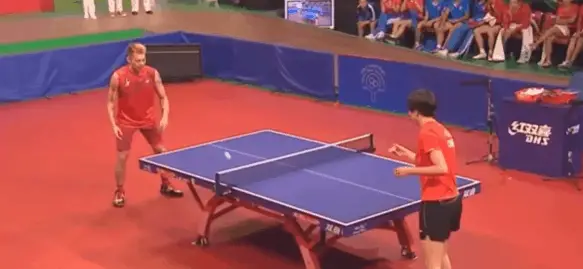Table tennis is one of the most revered racket sports in the world and one of the reasons for that is the ease with which most fans can also take to it at whatever level. With the health benefits which come along with playing ping pong, it also keeps those who are fitness-inclined to remain associated with the sport.
Because yep, table tennis is one of the best sports you could take to if you are looking at a holistic approach towards fitness. Whether you are looking at physical or mental health, table tennis is an excellent sport to get into and below we explain what health benefits you can expect from it.
Table of Content
Improves Flexibility and Coordination
While the speed at which a ping pong ball is played isn’t the quickest among sports, the difference between this sport and most other racket sports is the small playing arena. That pushes the need to have greater flexibility and coordination and with time and with more play, table tennis also helps you develop those qualities.
You would obviously need some basic form of hand-eye coordination to fall in love with ping pong but once you are there, practicing on your skills regularly, there is no doubting it can only sharpen your coordination.
In fact those who want to practice their table tennis skills by improving their hand-eye coordination, don’t even need to play the sport on a table. One of the ways to do this is to keep bouncing the ball off one’s ping pong paddle and following it up by doing the same with the edge of the racket as well.
Also Read:
Lower Stress on Joints
Unlike a sport like tennis where the body joints are under tremendous stress, ping pong is a much better option when it comes to keeping one’s joints in check.
The inherent requirement to play table tennis is good flexibility and hand-eye coordination, and again, in comparison with other sports, it’s not as difficult to get by without major physical strains.
Sure, table tennis players at the highest level do suffer injuries, muscle strains, shoulder injuries, elbow pains, ankle issues – they are all a part. However, in comparison with other sports, especially racket sports, the risks associated with fitness concerns are quite low in table tennis.
Table Tennis Helps Lose Weight
That’s the case with most sports, right? With table tennis you can expect to lose weight too, with players burning over 250 calories by playing for about an hour. With the quickness of the rallies which is associated with table tennis, it’s a perfect sport for practicing cardio as well.
One thing to note here is you cannot be casual, one-off player of ping pong and expect to lose weight obviously. Practice regularly, 3-4 times/week, an hour a day and there is no doubt you will begin to see the difference.
Table Tennis Helps You With Balance
One other requirement to get better at table tennis is having a good balance. Again this is a prerequisite for a few sports, including batting in the sport of cricket.
Obviously now, not everyone is born with a great balance but the more one plays the sport of table tennis, the better one gets at it and better is one’s balance.
The sport needs players to twist and turn following the trajectory of the ball and do it at a quickly enough and over an hour or so – all of this when combined together helps improve one’s balance.
Having a good body balance helps with age, reducing the possibility of falls but even for day to day activities like walking and climbing stairs, having a good balance is quite vital.
Ping Pong Keeps Brain Sharp
While we have discussed a host of physical benefits of playing ping pong, it must be remembered a lot of these benefits can also be attained with other sports.
Some take a lot out of the person physically while the advantage with table tennis it doesn’t cause a lot of strain to the body, especially to elderly in age. Pickleball is another sport which falls in this category, but ping pong has added benefits.
And those are mental.
Dr Daniel Amen, a very famous physician, psychiatrist and brain imaging expert, has described ping pong as “the world’s best brain sport” in an article here.
And why does he say that?
Because table tennis has a strongly aerobic component associated with it and with players having to make use of their lower and upper bodies, it makes an excellent sport for improving one’s mental faculties.
The need to keep tracking the ball during play and at the same time plan one’s strategies and responding to the spin imparted on it means some consider it to be a chess-like sport as well.
Also Read:
Alzheimer’s Disease & Table Tennis
According to Bounce Alzheimer’s Therapy Foundation, there is a correlation between playing table tennis and delaying the onset of the disease by a few years.
Again, because table tennis improves the overall awareness and keeps a player’s motor skills in action, the sport helps improve brain function, which in turn assists in keeping the aforementioned illness at bay.
What’s interesting to note is in the 2010 World Veterans Table Tennis Championships, Delow Dorothy created a record that might be difficult to beat but could also inspire others to take up table tennis as a sport to keep up one’s physical and mental faculty.
Dorothy was a 100 years old when she participated in the event, having earlier taken to the sport at the age of 50 in Australia. She competed with 84+ year-olds in the competition and even managed to win a match.
To give you an insight, the World Veterans Table Tennis Championships was first held in 1982 and are played every two years in eight different age categories – seniors 40, 50, 60, 65, 70, 75, 80 and 85 years in both singles and doubles.
Helps Form a Societal Bond
Sport does that. It helps people form bonds with those around, whether you are playing table tennis in a club or it’s with family and friends. It gives you something to look forward to and in turn helps build relationships while playing the sport.
In this day and age where people at various levels are moving more and more away from outdoor activities and getting stuck to their laptops and smart devices, there is also a sense of moving away from interactions with people.
A sport like table tennis fosters getting back to the community and while there’s no real correlation between that and a direct health benefit, it helps one keep mentally active as well.


